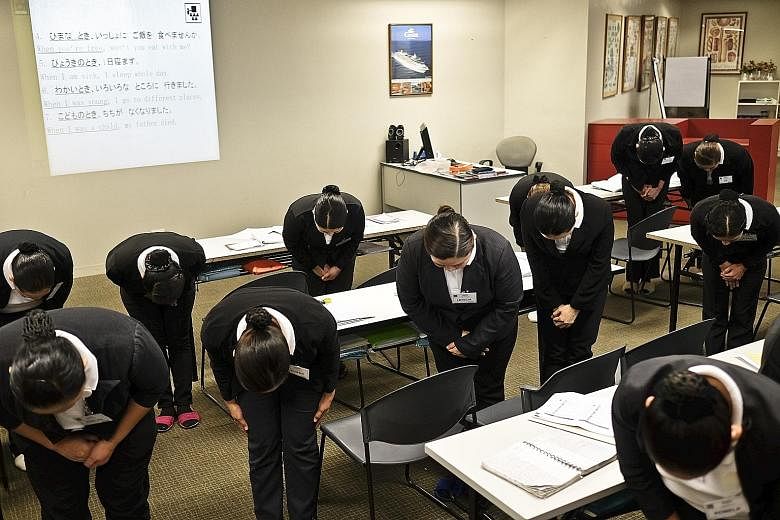MANILA • In a Japanese-style apartment, Ms Maria Del Bago learns how to bow properly, clean traditional tatami floor matting and decipher instructions for a high-tech toilet.
But she is not in Tokyo. She is 3,000km away in Manila.
Ms Bago, a 37-year-old computer science graduate who has worked as a housekeeper for an Arab family, is one of 26 experienced cleaners selected by Pasona Group Inc to undergo more than 400 hours of language and skills training in the Philippine capital. They are set to begin work in Japan in spring.
"I'd like to think I'm a fast learner," Ms Bago said. "I also trust that the training that I get will let me adjust easier and avoid culture shock."
The programme is the latest step towards opening up Japan to more foreigners, as Prime Minister Shinzo Abe's government seeks ways to counter a shrinking labour force threatening to hamstring the world's third-biggest economy.
But with the majority of Japanese opposed to a mass influx into a largely homogeneous society, the government and the firms involved have adopted an exacting admissions process.
"It's inadequate," Mr Robert Feldman, chief economist at Morgan Stanley MUFG Securities in Tokyo, said of the housekeeper policy. "However... that they're doing it at all is a piece of progress. Given what's happening in the rest of the labour market, it's at least one step forward."
The admission of cleaners from overseas - first to Kanagawa and Osaka, and later Tokyo - is aimed at making housekeeping services affordable for the middle class and getting more Japanese women into the workforce. These women are needed to help buck a current trend that could see the labour force of about 65 million collapsing by more than 40 per cent by 2060, according to a government panel projection.
Mr Heizo Takenaka, a former economy minister who now serves on a government panel on special economic zones and as chairman and director at Pasona, sees the programme as Japan's first serious attempt at bringing in the workers needed to put the economy on track.
While immigration opponents fear a rise in crime if rules are eased, he cited Singapore as an example of a country with many foreigners and low crime.
"This won't change things drastically," he said of the housekeeper programme. "It is a very Japanese way of doing things. We couldn't have them flooding in like they do in Hong Kong."
Under the new visa category created for special zones, cleaners must be employed full-time by agencies, rather than individuals, and be paid as much as their Japanese colleagues. Rather than living with a family, recruits must be provided with their own accommodation. They must also speak basic Japanese.
"Attitude is as important as skills," said trainer Contessa Tadena in the Philippines. She works at Magsaysay Centre for Hospitality and Culinary Arts, whose sister organisation Magsaysay Global Services Inc dispatches the maids.
"I teach my students the value of honesty, respect and politeness. You have to be kind as a whole, aside from being hard-working."
Two participants have already been rejected from the course for failing to show sufficient humility.
Mr Abe touted the idea of foreign cleaners and elderly-care workers in a speech at Davos, Switzerland, in January 2014. But with employers required to jump through many hoops, it has taken three years to get the first couple of dozen workers ready.
"We are doing this for the first time, so there was some coordination," Chief Cabinet Secretary Yoshihide Suga said on Thursday. "It is our responsibility to create a system that can be widely used."
BLOOMBERG

